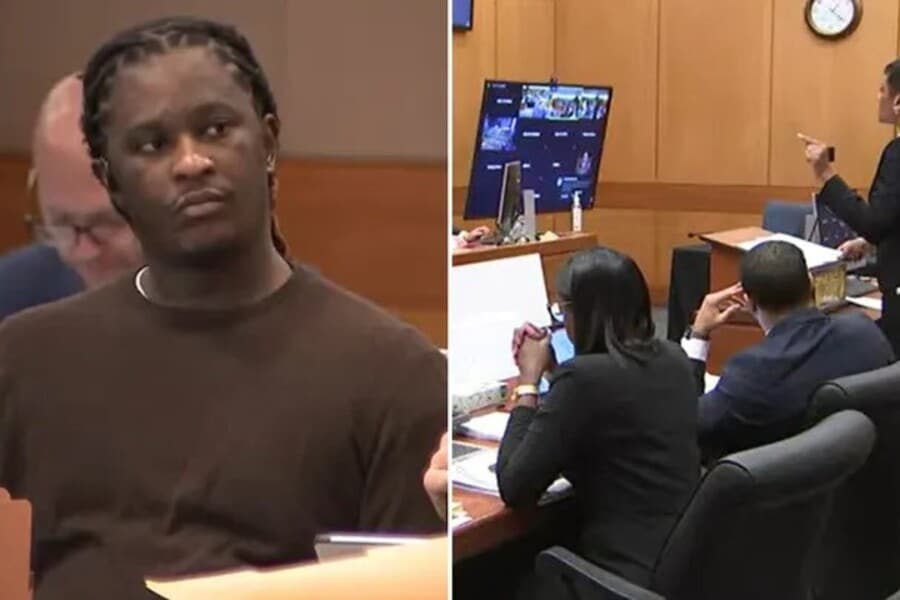
In a stark display of judicial challenges, Fulton County District Attorney Fani Willis faced significant scrutiny this week across two high-profile cases: the racketeering trial of rapper Young Thug, whose legal name is Jeffery Lamar Williams, and the election interference investigation involving former President Donald Trump.
These cases highlight the complexities of legal strategy and ethical conduct within high-stakes prosecutions but also underscore the immense pressures and pitfalls that can plague public prosecutors.
The trial of Young Thug involves accusations of the rapper leading a violent street gang, Young Slime Life (YSL), affiliated with the national Bloods gang, which prosecutors argue committed multiple violent crimes to bolster its influence.
The legal proceedings have been marked by fierce debates over evidence admissibility, witness testimony, and prosecutorial conduct, reflecting the challenges of managing a case under intense public and media scrutiny.
Concurrently, the Trump election interference case presents its own set of challenges, with allegations that the former president attempted to influence the election results in Georgia. The case has drawn national attention, not only for its potential historical significance but also for the ethical questions it raises regarding the conduct of the prosecutors involved, including potential conflicts of interest and the handling of public disclosures.
These judicial proceedings illuminate the intricate balance that prosecutors must maintain between aggressive advocacy and the ethical obligations of their office. The scrutiny of Willis’s handling of these cases also exemplifies the broader issues facing the legal system today, as public officials navigate the fine line between duty to the public and personal integrity.
Confrontation in the Courtroom: The Young Thug Trial
In the ongoing trial of rapper Young Thug, born Jeffery Lamar Williams, who is accused of leading a violent street gang known as Young Slime Life (YSL), tensions flared dramatically.
Chief Deputy District Attorney Adriane Love, representing DA Willis’s office, engaged in a vociferous shouting match with Judge Ural Glanville over the admissibility of key evidence. This courtroom battle shed light on the intense pressure prosecutors face and the critical importance of evidentiary procedures in criminal trials.
The confrontation occurred when Judge Glanville decided to exclude certain evidence shortly before the jury was to enter, leading to a heated exchange. He admonished ADA Love, emphasizing the necessity for better preparation, “Well then you all should have gotten yourself together beforehand,” signaling frustration with what he perceived as prosecutorial missteps. Love defended her team’s efforts vehemently, highlighting the challenges and strategic negotiations inherent in such high-profile litigation.
Judicial Reprimand in Trump Election Interference Case
Simultaneously, in a related but separate legal arena, DA Willis encountered judicial disapproval from Judge Scott McAfee concerning her potential conflict of interest in the Trump election interference case.
The judge’s 23-page decision allowed the case to proceed but not without stern criticism directed at Willis for her previous romantic involvement with Special Prosecutor Nathan Wade and her public remarks regarding the case.
Judge McAfee’s critique extended beyond the personal entanglements of Willis and Wade, touching on issues of professional ethics and public accountability. He expressed concerns over Willis’s conduct, which he suggested might affect the impartiality and fairness required in her prosecutorial role. “Every newly minted prosecutor should be instilled with the notion that she seeks justice over convictions,” McAfee noted, underscoring the expectation of ethical purity in legal proceedings.
Implications Of The Judicial Critiques
These judicial critiques come at a time when public trust in legal institutions is notably fragile. For Willis, the dual reprimands could signify deeper challenges ahead in both maintaining public confidence and navigating the legal intricacies of her office’s high-profile cases.
The implications are particularly significant given the nature of the charges in both trials—racketeering and election interference—each resonating deeply with ongoing national discussions about crime, justice, and political integrity.
In the Young Thug case, the excluded evidence and the subsequent courtroom dispute may potentially impact the trial’s outcomes and the broader prosecutorial efforts against gang-related activities in Atlanta. Meanwhile, the admonitions in the Trump case raise questions about the possible influences of personal relationships on legal judgments and the essential independence of judicial proceedings.
The Road Ahead For DA Willis
As DA Willis continues to steer these contentious cases, the path forward involves navigating the legal critiques while upholding the stringent demands of her office. The coming months will likely see her and her team making concerted efforts to refine their legal strategies and ensure rigorous compliance with ethical standards. This will be crucial not only for the success of their prosecutions but also for restoring and maintaining public trust in their endeavors.
Furthermore, Willis’s handling of these cases will test her leadership and possibly set precedents for how similar cases are approached nationally. The outcomes will not only define her tenure but also potentially influence prosecutorial conduct across the United States, particularly in cases involving high-profile individuals and sensitive political matters.
As Fani Willis faces these legal and ethical hurdles, the broader implications for the justice system are clear. These trials underscore the delicate balance between aggressive prosecution and the maintenance of ethical standards.
They also highlight the critical role of judicial oversight in ensuring that this balance is respected, serving as a reminder of the judiciary’s role as a check on prosecutorial power.
DA Fani Willis’s week in court, marked by reprimands and strategic setbacks, illustrates the complexities facing modern prosecutors. How she responds to these challenges will not only affect the immediate cases at hand but also resonate through her office’s future endeavors and the broader legal landscape.
As the trials progress, all involved parties must navigate these turbulent waters with an eye toward justice, transparency, and the public good, ensuring that the pursuit of justice strengthens, rather than undermines, public trust in the legal system.








